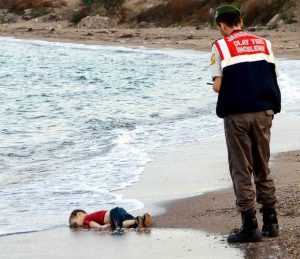 In the midst of violence and poverty, Syrian refugees have recently come to represent the largest refugee population in the world. Syria is overrun with disorder as they go into the fifth year of their civil war. Each day neighborhoods are bombed, killing innocent civilians and leaving massive numbers of people homeless and displaced. Syrians who withstand the brutal attacks are often forced to seek asylum in other countries because of their inability to survive in their own.
In the midst of violence and poverty, Syrian refugees have recently come to represent the largest refugee population in the world. Syria is overrun with disorder as they go into the fifth year of their civil war. Each day neighborhoods are bombed, killing innocent civilians and leaving massive numbers of people homeless and displaced. Syrians who withstand the brutal attacks are often forced to seek asylum in other countries because of their inability to survive in their own.
Unfortunately, many countries reject applications for asylum because of their self-set limits and political and economic situations. Displaced Syrians also encounter denial of exit visas and UN refugee status for complicated reasons, such as visiting specific countries. These rejections leave Syrian refugees helpless and desperate for a safer life. In their futile circumstances many attempt to flee the country by trying to cross the Mediterranean Sea to Europe. Refugees are charged 100 times the price of a flight in Europe to travel by boat and potentially never see land again. These boats are overpopulated and unsafe, making this point the most deadly migrant crossing spot in the world. In 2015 alone, over 2,600 migrants have died trying to enter Europe from the Mediterranean Sea in hopes of fleeing their war-torn countries.
One of these people is three-year-old Aylan Kurdi, a drowned Syrian migrant who was searching for a better life with his family.
A photo of Kurdi face down in the Turkish sands has gone viral, finally bringing the attention of many people to the horrific situation that has been happening in Syria for half a decade. Sadly, more than half of all Syrian refuges are children and Kurdi’s story is common among the horrific events that happen every day. Syria has been in disarray for years, and these children are often left without schooling and forced to work in order to survive. A generation left without an education could have disastrous effects on the future of their country, economically and politically.
Syria’s current state also compromises the wellbeing of its surrounding countries. Many Syrian refugees flee to Lebanon and Jordan, the regions two smallest countries. The refugees reside in these countries illegally, and have no way to earn an income. This influx of people coupled with their lack of economic contribution is leaving these countries under tremendous pressure.
It is traumatizing for any single country to accept a massive number of refugees, and those that do are clearly suffering. Because of this, countries need to cooperate and give asylum to as many Syrian refugees as possible to avoid overwhelming a select few.
Countries around the world are realizing the urgency with which they need to accommodate Syrian refugees. Germany has recently announced their plan to accept 800,000 refugees this year; the UK plans to take 10,000. Iraq, Egypt, Greece, and Sweden already house over 40,000 Syrian refugees each. Faced with these numbers, the United States proposed plan to take a mere 5,000 to 8,000 refugees seems miniscule.
The United States is one of the few countries with the economic and geographic capability to take a large portion of Syrian refugees and yet it has suggested taking so few. Despite being a country built on immigration, the United States has yet to offer asylum to more people. Additionally, the amount of Syrian refugees residing in other countries is leaving them with a huge burden that the US is so far unwilling to help alleviate. The situation in Syria is desperate and severe, and despite the large number that have fled the country, a massive 7.6 million are still internally displaced.
The U.N. predicts that the crisis in Syria will become “the worst exodus since the Rwandan genocide” and countries should recognize the need to step up in support of each other whether they are neighboring or not. Harboring everyone in these tragic situations is idealistic and utopian, but as presidential candidate Martin O’Malley points out, the United States alone is only offering to shelter 8% of the Syrian refugees it is capable of. It is blatantly realistic for many countries to allow many desperate Syrians into their countries legally. Without the expansion of the immigration limits for Syrian refugees, they will continue to succumb to their desperation and take illegal and potentially fatal paths to a safer location.
Simply, humans need to protect each other.














